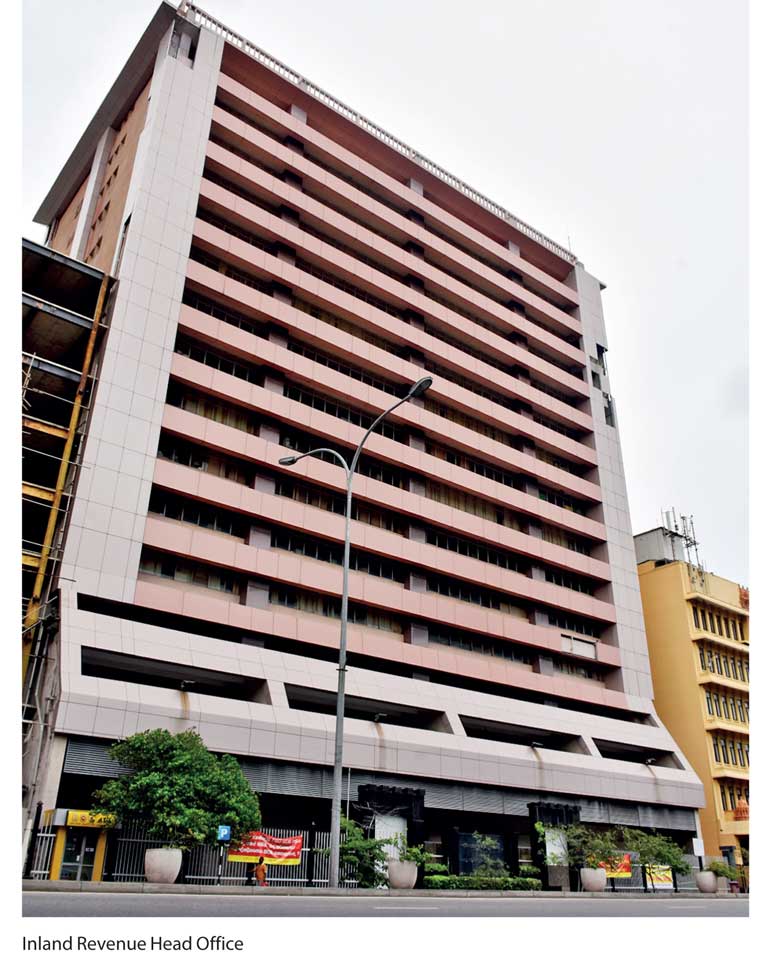Wednesday Feb 18, 2026
Wednesday Feb 18, 2026
Friday, 9 March 2018 00:00 - - {{hitsCtrl.values.hits}}

 With Sri Lanka promoting itself as a commercial hub for investors and the drive by the policy makers to establish Free Trade Agreements, the network of treaties that Sri Lanka has entered into with other countries to prevent double taxation automatically obtains enhanced importance.
With Sri Lanka promoting itself as a commercial hub for investors and the drive by the policy makers to establish Free Trade Agreements, the network of treaties that Sri Lanka has entered into with other countries to prevent double taxation automatically obtains enhanced importance.
Section 157 of Chapter XX of the Constitution of Sri Lanka provides for International Agreements & Treaties. Under the Income Tax Ordinance of 1932, double taxation relief was granted to persons who were liable to pay tax in Sri Lanka and tax on the same income in the United Kingdom and to countries within the British Empire.
The first double tax treaty agreement the country entered into for the prevention of double taxation was with Japan in 1967. Since then, Sri Lanka has entered into 44 Double Tax Treaties with different countries. 23 out of the 44 Double Tax Treaties were entered in to prior to the year 2000.
The latest double tax treaty to be implemented is the Singapore-Sri Lanka double tax treaty. The treaty, which is operational from this year, is a revision of the earlier agreement entered into on 25 January 1980. Negotiations for the revision of Agreement between Sri Lanka and Singapore were held in the year 2013/14 and a bilateral agreement was signed on 03/04/2014 followed by the revised double tax agreement being issued in November 2016.
In addition to double tax treaties, Sri Lanka has also entered in to a multilateral treaty (South Asian Association for Regional Corporation) effective from Year of Assessment 2011/12.
Double taxation is twofold; juridical and economic double taxation. Double taxation treaties provide a mechanism for elimination of juridical double taxation. Hence Sri Lankan tax payers, both individuals and companies, who suffer taxes in foreign countries achieved relief from double taxation only via Double Tax Treaties.
Sri Lanka to date has entered into treaties for the prevention of double taxation with 44 countries. Therefore any Sri Lankan taxpayer who suffered taxes in a country where Sri Lanka has not entered into a treaty had no relief. This status is bound to change with the introduction of the new Inland Revenue Act No. 24 of 2017.
The new Act will be effective from April 2018 and the New Inland Revenue Act contains provisions for the Sri Lankan Government to provide unilateral relief to tax payers who have suffered tax in a country where Sri Lanka has not entered into a double tax treaty, via the foreign tax credit mechanism. Hence this will provide relief to many Sri Lankan tax payers.
In addition to the introduction of unilateral relief for foreign tax credit, the new Inland Revenue Act has also couched provisions pertaining to ‘Permanent Establishment’ into the domestic Statute, a concept hitherto applied in Sri Lanka only in the context of Double Tax Treaties.
The definition of ‘Permanent Establishment’ and knowledge pertaining to the various tests to be applied to ascertain the creation of a Permanent Establishment would permit a corporate to reduce the exposure to tax and thereby manage the tax cost of the entity.
On the other hand, the computation of the tax liability of a Permanent Establishment could attract tax rules that may differ from the rules laid down in the domestic Inland Revenue Act. Moreover, it’s vital to appreciate that if cross border royalties, dividends or interests are effectively connected with the Permanent Establishment or a Fixed Base in the country, the tax consequences that ensue are essentially different to that of a normal flow of cross border royalty, interest or dividends which are not effectively connected to a Permanent Establishment.
The Sri Lankan double tax treaties could be categorised into two: Comprehensive Treaties and Limited Treaties. The treaties with countries such as Hong Kong, Oman, Saudi Arabia fall into latter category whereas rest of the treaties are Comprehensive Treaties.
Limited Treaties have been executed for the purpose of providing relief to the taxpayers only in relation to profits deriving from one or few sources. For instance the purpose of the Limited Treaty with Hong Kong is merely to provide relief from double taxation for profits derived from shipping operations and air transport.
This treaty does not provide relief from double taxation for other cross border fund flows between Sri Lanka and Hong Kong in the nature of royalties, dividends, interest, etc. Thus up until now though there was no relief from double taxation for Sri Lankan tax payers in relation to taxes suffered in Hong Kong. Due to the right for foreign tax credit provision in the new Inland Revenue Act effective from April, the Sri Lankan Tax payers would no longer suffer from this disadvantage due to double taxation
An analysis of Sri Lanka’s treaties of prevention of double taxation highlights that the recent treaties with India and Singapore provide dividend tax to be reduced to 7.5% by the source country under certain circumstances when the dividends are being paid to the shareholders in the home country. Therefore it is important this fact be taken cognisance of by the officers of the company involved in deduction and payment of withholding tax on dividends to the tax office.
The classification of a cross border payment, whether the same constitutes a ‘royalty’ or a ‘business profit’, is an issue that has attracted attention in many countries as the classification results in distinct tax implications under the treaties. The ability to comprehend and represent the true nature of the cross border payment would assist the tax payer to achieve tax savings rather than being amenable to the dictates of the officers of the Inland Revenue Department.
An engagement of an expatriate in the country may either be in the capacity of an employee or as an independent personal service provider. The treaties for prevention of double taxation view the two categories in different perspectives and apply distinct rules in order to provide relief from double taxation. A clear understanding of the applicable rules would provide the opportunity for managing the tax cost by structuring the expatriate’s presence in the other jurisdiction.
An interesting body of case law points out the criteria to be considered for determination of the rule to be prevailed as to when there is a conflict between the rules in domestic statute and the treaty. Associated with this issue, is the concept of “treaty override”. The quantum of deductibility of head office expenditure is a common issue subject to this evaluation.
As per Section 97 of the prevailing Inland Revenue Act No 10 of 2006, the clauses of the Double Tax Treaty overrides the provisions of the domestic statute. Accordingly, in relation to withholding tax on payments such as dividend, interest, royalty if the double tax agreement provides a lower rate when compared to the income tax rate under the domestic statute, the treaty rate could be applied.
Cross border royalty is liable to withholding tax of 15% under the prevailing domestic Income Tax Statute (the new inland revenue act imposes a 14% withholding tax) however certain treaties such as Malaysia, India, Singapore, Switzerland, Mauritius, Qatar , United Arab Emirates, Seychelles provide for a lower rate of 10%, etc.
A typical double tax treaty contains an Article for tax authorities in both countries to exchange information in order to collect taxes due to respective States. However the scope of this Article in comparison to other developments that are taking place in the global arena is somewhat restrictive in nature.
The latest developments such as Foreign Account Tax Compliance Act (FATCA) and Common Reporting Standards (CRS) provide mechanisms for automatic exchange of information of all covered persons periodically. Contrasting to this approach under the scope of an Article pertaining to exchange of information in a Tax Treaty, the Tax Authority (Competent Authority) may seek information only in relation to a particular tax payer and not information pertaining to all residents in the other jurisdiction.
In order to provide relief for taxpayers from double taxation in the home country and country of source, the right to tax a particular item of income or capital is allocated to one country at the expense of the other country. In some cases the right of the country to impose a tax is restricted by including a ceiling in the treaty.
Due to this main function of the allocation of taxing right or restriction of right to tax of a country, a Treaty Country is bound to lose tax revenue, whilst providing relief to tax payers engaged in cross border transactions and international trade. Due to this aspect, negotiations of treaties for prevention of double taxation should be carried out carefully bearing in mind the best interest of Sri Lanka’s economy. Hence a high degree of negotiating skills are called for from those involved in treaty negotiations.
Though OECD and UN Model Conventions are the two frequently referred and used conventions, these are not the only conventions used by the nations when negotiating treaties. Sri Lanka’s treaty with the USA is based on the US Model Convention whereas Latin American nations base their treaty negotiations on the ‘Andean Model’.
In order to assist to clarify the each model convention, the Commentaries to the respective Model Convention could be accessed. However, as per the Rules pertaining to the Interpretation of Double Tax Treaties one could not attach too much weight to the accompanying commentaries. As per the hierarchy of the applicable rules, commentaries have been afforded a low priority.
[The writer, LLB, Attorney-at-Law, FCMA (UK), is Principal Tax & Regulatory, KPMG.]
Box
KPMG seminar
A seminar organised by KPMG at Movenpick Hotel, Colombo on 15 March (from 9 a.m. to 12:15 p.m.) has been structured for the participants to gather vital information pertaining to obtaining relief from double taxation in different jurisdictions whilst engaged in business, employment or contracting expatriates and other activities such as visiting other countries for rendering professional services, studies or holding director positions in foreign companies, etc.
The participants would also gain knowledge to avoid pitfalls when remitting cross border payments such as royalties, technical fees, dividends, interest etc. The seminar would also shed light on the impact of the provisions of the New Inland Revenue Act to be operative from April in relation to providing relief from double taxation. (Please call 011 5426 210 for registrations.)
The key speaker will be Suresh R. I. Perera, Principal Tax & Regulatory, KPMG. Perera is multidisciplinary professional specialising in taxation with an accounting cum legal, qualifications.